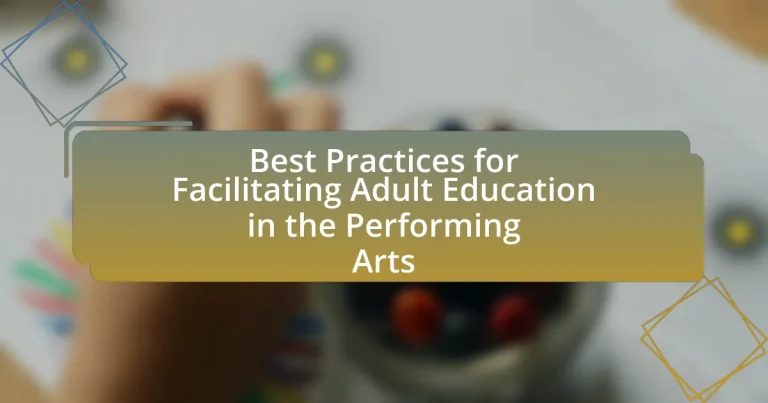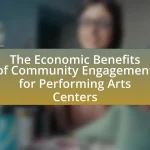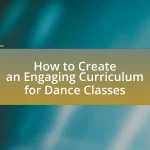The article focuses on best practices for facilitating adult education in the performing arts, emphasizing the importance of creating a supportive learning environment, incorporating experiential learning, and fostering collaboration among participants. It outlines effective strategies for engaging adult learners, such as hands-on workshops, peer feedback, and the integration of technology. Additionally, the article discusses the significance of understanding adult learning theory, tailoring curriculum design to meet learners’ needs, and evaluating program effectiveness through various assessment methods. Challenges faced by educators, including time constraints and financial limitations, are also addressed, along with innovative approaches to enhance community involvement and continuous learning in the performing arts.
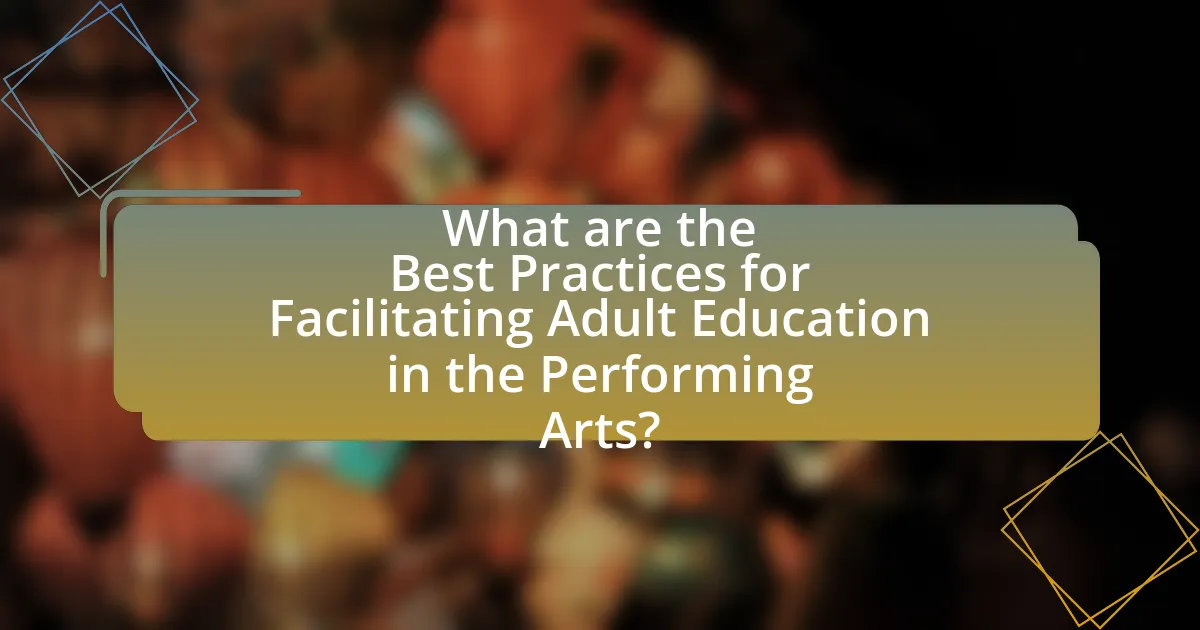
What are the Best Practices for Facilitating Adult Education in the Performing Arts?
The best practices for facilitating adult education in the performing arts include creating a supportive learning environment, incorporating experiential learning, and fostering collaboration among participants. A supportive learning environment encourages open communication and respect, which is essential for adult learners who often bring diverse experiences and perspectives. Experiential learning, such as hands-on workshops and performances, allows adults to apply their skills in real-world contexts, enhancing retention and engagement. Collaboration among participants promotes peer learning and networking, which are vital in the performing arts community. Research indicates that adult learners benefit significantly from these practices, as they align with their intrinsic motivations and learning styles, ultimately leading to more effective educational outcomes.
How can educators effectively engage adult learners in the performing arts?
Educators can effectively engage adult learners in the performing arts by incorporating experiential learning opportunities that allow for active participation and collaboration. Research indicates that adult learners benefit from hands-on experiences, such as workshops and performances, which foster a sense of community and personal investment in the learning process. For instance, a study by Knowles (1980) on adult learning theory emphasizes the importance of self-directed learning and practical application, suggesting that adults are more motivated when they can relate their experiences to real-world contexts. Additionally, providing opportunities for peer feedback and mentorship can enhance engagement, as adults often value the insights and perspectives of their peers.
What techniques promote active participation among adult learners?
Techniques that promote active participation among adult learners include collaborative learning, experiential activities, and the use of technology. Collaborative learning encourages interaction and teamwork, allowing learners to share knowledge and skills, which enhances engagement. Experiential activities, such as role-playing or hands-on projects, provide practical experience that reinforces learning and keeps participants involved. The integration of technology, such as online discussion forums or interactive multimedia, facilitates communication and offers diverse ways for learners to engage with the material. Research indicates that these methods significantly increase motivation and retention in adult education settings, particularly in the performing arts, where active involvement is crucial for skill development.
How can educators create a supportive learning environment?
Educators can create a supportive learning environment by fostering open communication and mutual respect among students. Establishing clear expectations and providing constructive feedback encourages students to express their thoughts and feelings, which enhances their learning experience. Research indicates that environments characterized by trust and collaboration lead to higher engagement and retention rates in adult education settings, particularly in the performing arts. For instance, a study by the National Endowment for the Arts found that supportive peer interactions significantly improve artistic skills and confidence in adult learners.
Why is understanding adult learning theory important in the performing arts?
Understanding adult learning theory is important in the performing arts because it informs educators about how adults acquire and apply knowledge effectively. Adult learners often bring prior experiences and specific motivations to their education, which can influence their engagement and retention of new skills. For instance, research by Knowles (1980) emphasizes that adults learn best when they are involved in the planning and evaluation of their instruction, highlighting the need for participatory teaching methods in performing arts education. This understanding allows instructors to tailor their approaches, fostering a more effective and relevant learning environment that enhances both artistic skills and personal growth.
What are the key principles of adult learning theory?
The key principles of adult learning theory include self-direction, experiential learning, relevance, and readiness to learn. Self-direction emphasizes that adults prefer to take control of their own learning process, allowing them to set goals and evaluate their progress. Experiential learning highlights the importance of drawing from personal experiences, which enhances understanding and retention. Relevance indicates that adults are motivated to learn when the material is applicable to their personal or professional lives. Readiness to learn suggests that adults are more inclined to engage with content that addresses their immediate needs or challenges. These principles are supported by research from Malcolm Knowles, who is a foundational figure in adult education, emphasizing that adult learners are distinct from children in their learning preferences and motivations.
How do these principles apply specifically to the performing arts?
The principles of adult education apply to the performing arts by emphasizing experiential learning, collaboration, and self-directedness. In the performing arts, experiential learning is crucial as participants engage in hands-on activities such as acting, dancing, or playing instruments, which enhances retention and skill development. Collaboration is evident in ensemble work, where individuals learn from each other and develop teamwork skills, reflecting the principle that adults learn effectively in social contexts. Self-directedness is fostered through opportunities for learners to set personal goals and choose projects that resonate with their interests, aligning with the adult education principle that values autonomy. These applications are supported by research indicating that active participation and peer interaction significantly improve learning outcomes in adult education settings, particularly in creative fields like the performing arts.
What role does curriculum design play in adult education for the performing arts?
Curriculum design plays a crucial role in adult education for the performing arts by ensuring that learning experiences are relevant, engaging, and tailored to the needs of adult learners. Effective curriculum design incorporates adult learning principles, such as self-directed learning and experiential activities, which are essential for fostering creativity and skill development in performing arts disciplines. Research indicates that well-structured curricula enhance motivation and retention, as seen in programs that integrate practical performance opportunities with theoretical knowledge, thereby promoting a holistic understanding of the art form.
How can curriculum be tailored to meet the needs of adult learners?
Curriculum can be tailored to meet the needs of adult learners by incorporating flexible scheduling, relevant content, and experiential learning opportunities. Adult learners often have diverse responsibilities, so offering classes during evenings or weekends accommodates their schedules. Additionally, integrating real-world applications and case studies related to the performing arts ensures that the material is pertinent and engaging. Research indicates that experiential learning, such as hands-on workshops or performances, enhances retention and skill development among adult learners, making the curriculum more effective.
What types of assessments are effective for adult learners in the performing arts?
Effective assessments for adult learners in the performing arts include formative assessments, peer evaluations, and self-assessments. Formative assessments, such as ongoing feedback during rehearsals, allow instructors to gauge progress and adjust teaching methods accordingly. Peer evaluations encourage collaboration and critical thinking, as learners assess each other’s performances, fostering a supportive learning environment. Self-assessments empower adult learners to reflect on their own skills and growth, promoting autonomy and self-directed learning. Research indicates that these assessment types enhance engagement and skill acquisition in adult education settings, particularly in the performing arts.
How can technology enhance adult education in the performing arts?
Technology can enhance adult education in the performing arts by providing access to diverse learning resources and facilitating interactive experiences. Online platforms enable adult learners to access instructional videos, virtual workshops, and live-streamed performances, which broaden their exposure to various art forms. For instance, tools like Zoom and Google Classroom allow for real-time feedback and collaboration among peers and instructors, fostering a community of practice. Additionally, software for music composition and video editing empowers learners to create and share their work, enhancing their skills through practical application. Research indicates that integrating technology in education can improve engagement and retention rates, making it a valuable asset in adult education within the performing arts.
What tools and platforms are most beneficial for adult learners?
Online learning platforms such as Coursera, Udemy, and LinkedIn Learning are most beneficial for adult learners. These platforms offer a wide range of courses tailored to various skill levels and interests, including performing arts. For instance, Coursera partners with universities to provide accredited courses, while Udemy features user-generated content that allows learners to choose from thousands of topics. LinkedIn Learning focuses on professional development, offering courses that enhance skills relevant to the workforce. Research indicates that adult learners benefit from flexible, self-paced learning environments, which these platforms provide, allowing them to balance education with personal and professional commitments.
How can online resources be integrated into traditional teaching methods?
Online resources can be integrated into traditional teaching methods by utilizing digital platforms to enhance engagement and accessibility. For instance, educators can incorporate online videos, interactive simulations, and digital discussion forums to complement in-person instruction, allowing students to explore concepts at their own pace. Research indicates that blended learning approaches, which combine online and face-to-face elements, can improve learning outcomes; a study by Graham et al. (2013) found that students in blended courses performed better than those in purely traditional settings. This integration not only enriches the learning experience but also caters to diverse learning styles, making education more inclusive and effective in the performing arts.
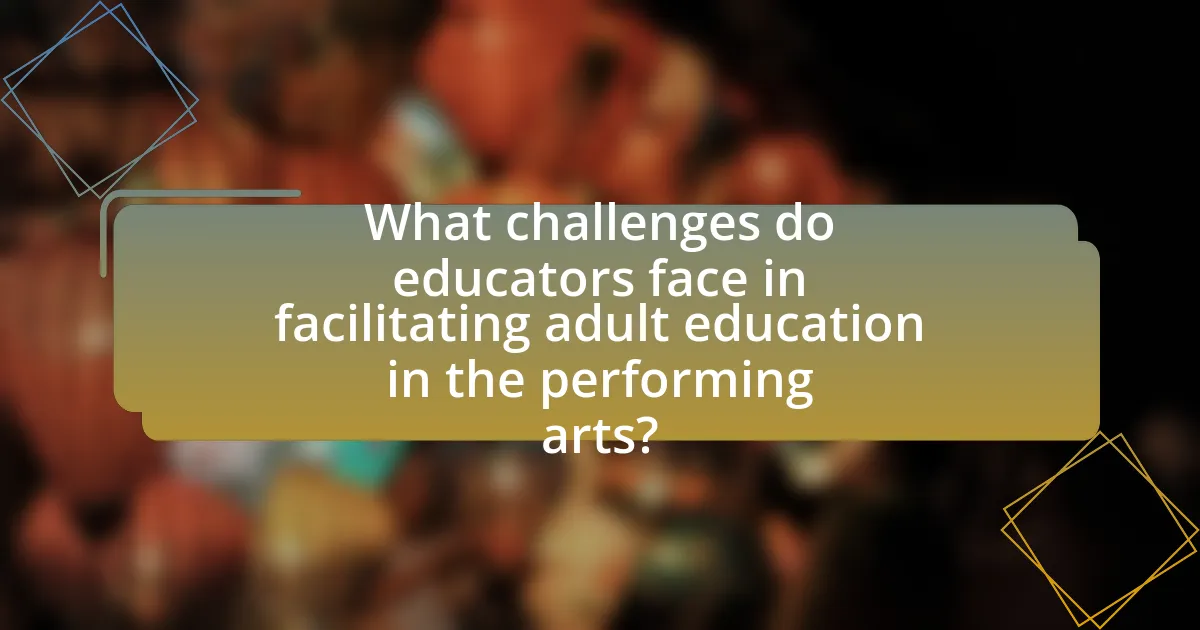
What challenges do educators face in facilitating adult education in the performing arts?
Educators face several challenges in facilitating adult education in the performing arts, including diverse learning styles, varying levels of prior experience, and time constraints. Adult learners often come from different backgrounds and possess unique motivations, which can complicate the teaching process. For instance, a study by Knowles (1980) on adult learning principles highlights that adults learn best when they can relate new information to their existing knowledge and experiences. Additionally, many adult students have limited time due to work and family commitments, making it difficult to engage consistently in the learning process. This is supported by research from the National Endowment for the Arts, which indicates that adult participation in arts education often declines due to competing responsibilities. These factors create a complex environment for educators aiming to deliver effective and inclusive performing arts education.
How can educators overcome common barriers to participation?
Educators can overcome common barriers to participation by implementing flexible scheduling, providing financial assistance, and fostering an inclusive environment. Flexible scheduling allows adult learners to balance education with work and family commitments, which is crucial since 70% of adult learners juggle multiple responsibilities. Financial assistance, such as scholarships or sliding scale fees, can alleviate economic barriers, as studies show that cost is a significant deterrent for many potential participants. Additionally, creating an inclusive environment that respects diverse backgrounds and learning styles encourages participation; research indicates that inclusive practices can increase engagement by up to 30%.
What strategies can be employed to address time constraints for adult learners?
To address time constraints for adult learners, flexible scheduling and modular course design are effective strategies. Flexible scheduling allows adult learners to choose class times that fit their personal and professional commitments, which is crucial since many adults juggle work and family responsibilities. Modular course design breaks down content into smaller, manageable units, enabling learners to progress at their own pace and fit learning into their busy lives. Research indicates that adult learners benefit from these approaches, as they enhance engagement and retention by accommodating individual schedules and learning preferences.
How can financial limitations be mitigated in adult education programs?
Financial limitations in adult education programs can be mitigated through the implementation of sliding scale tuition fees, grants, and partnerships with local businesses. Sliding scale tuition allows individuals to pay based on their income, making education more accessible. Grants from government and private organizations can provide necessary funding to cover costs, while partnerships with local businesses can lead to sponsorships or resource sharing, reducing overall expenses. For instance, a study by the National Endowment for the Arts found that community partnerships significantly enhance funding opportunities for arts education programs, demonstrating the effectiveness of collaborative financial strategies.
What are the best methods for evaluating the effectiveness of adult education programs in the performing arts?
The best methods for evaluating the effectiveness of adult education programs in the performing arts include participant feedback, performance assessments, and longitudinal studies. Participant feedback, gathered through surveys and interviews, provides direct insights into learners’ experiences and satisfaction levels, which are crucial for understanding program impact. Performance assessments, where learners showcase their skills in front of an audience or through recorded performances, offer measurable evidence of skill acquisition and artistic development. Longitudinal studies track participants over time to assess long-term benefits and changes in engagement with the arts, providing a comprehensive view of program effectiveness. These methods collectively ensure a robust evaluation framework that aligns with the goals of adult education in the performing arts.
What metrics should be used to assess learner outcomes?
To assess learner outcomes in adult education within the performing arts, metrics such as skill acquisition, learner engagement, and performance assessments should be utilized. Skill acquisition can be measured through pre- and post-assessments that evaluate specific competencies in areas like acting, music, or dance. Learner engagement can be gauged through attendance rates, participation in discussions, and feedback surveys, which indicate the level of involvement and interest in the learning process. Performance assessments, including recitals or showcases, provide concrete evidence of learners’ abilities and progress, allowing for a comprehensive evaluation of their development. These metrics collectively offer a robust framework for understanding and enhancing learner outcomes in this educational context.
How can feedback be effectively gathered from adult learners?
Feedback can be effectively gathered from adult learners through structured surveys and reflective discussions. Structured surveys allow for quantitative data collection, enabling educators to analyze trends and areas for improvement. Reflective discussions foster a qualitative understanding of learners’ experiences, encouraging open dialogue and deeper insights. Research indicates that adult learners appreciate opportunities for feedback that are timely and relevant, enhancing their engagement and learning outcomes. For instance, a study by Knowles (1980) emphasizes the importance of involving adult learners in the feedback process to promote self-directed learning and accountability.
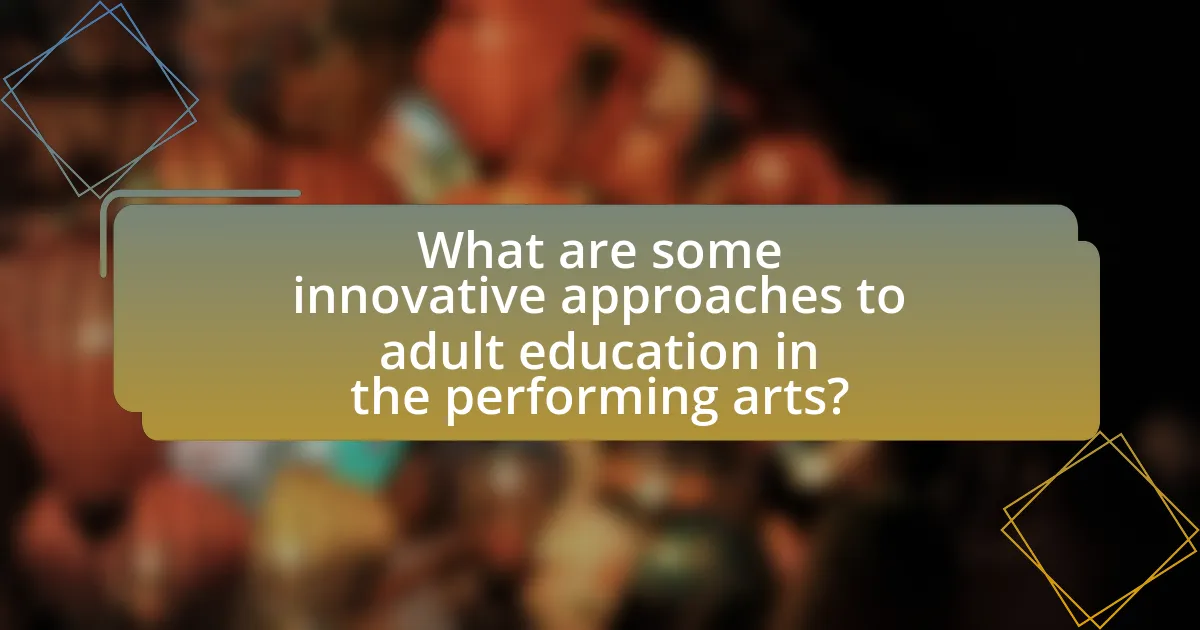
What are some innovative approaches to adult education in the performing arts?
Innovative approaches to adult education in the performing arts include experiential learning, technology integration, and community engagement. Experiential learning emphasizes hands-on experiences, allowing adults to actively participate in performances and workshops, which enhances retention and skill development. Technology integration, such as online platforms and virtual reality, provides flexible learning environments and access to diverse resources, enabling adults to learn at their own pace. Community engagement fosters collaboration and networking opportunities, allowing adult learners to connect with local artists and organizations, thereby enriching their educational experience. These methods have been shown to increase motivation and improve learning outcomes in adult education settings.
How can experiential learning be incorporated into adult education?
Experiential learning can be incorporated into adult education by integrating hands-on activities, real-world problem-solving, and reflective practices into the curriculum. This approach allows adult learners to engage actively with the material, enhancing retention and understanding. For instance, in the performing arts, educators can facilitate workshops where participants practice techniques in a live setting, receive immediate feedback, and reflect on their experiences to deepen their learning. Research by Kolb (1984) emphasizes that experiential learning enhances critical thinking and application of knowledge, making it particularly effective for adult learners who benefit from practical engagement.
What are the benefits of hands-on workshops and performances?
Hands-on workshops and performances enhance learning by providing practical experience and fostering engagement. These interactive formats allow participants to apply theoretical knowledge in real-world scenarios, which improves retention and understanding. Research indicates that experiential learning, such as that found in workshops, leads to higher levels of skill acquisition and confidence among adult learners. For instance, a study published in the Journal of Adult Learning found that participants in hands-on workshops reported a 30% increase in their ability to perform tasks compared to traditional lecture-based learning. Additionally, performances encourage collaboration and communication, essential skills in the performing arts, thereby enriching the educational experience.
How can collaboration with local artists enhance learning experiences?
Collaboration with local artists enhances learning experiences by providing authentic, real-world insights and skills that enrich educational content. Engaging local artists allows learners to connect theory with practice, fostering creativity and critical thinking. For instance, studies show that programs integrating local artists into educational settings lead to increased student engagement and improved retention of material, as evidenced by a report from the National Endowment for the Arts, which highlights that arts-integrated learning can boost academic performance and social skills. This collaboration not only diversifies the learning environment but also cultivates a sense of community and cultural appreciation among learners.
What role does community engagement play in adult education for the performing arts?
Community engagement plays a crucial role in adult education for the performing arts by fostering collaboration, enhancing learning experiences, and building a supportive network. Engaging with the community allows adult learners to connect with local artists, organizations, and audiences, which enriches their understanding of the performing arts and provides practical opportunities for application. Research indicates that programs incorporating community involvement lead to higher retention rates and increased satisfaction among participants, as they feel more invested in their learning environment. For instance, a study by the National Endowment for the Arts found that community-based arts education initiatives significantly improve participants’ skills and confidence, demonstrating the positive impact of community engagement on adult education in the performing arts.
How can partnerships with local organizations benefit adult learners?
Partnerships with local organizations can significantly benefit adult learners by providing access to resources, expertise, and community support. These collaborations often facilitate tailored educational programs that meet the specific needs of adult learners, enhancing their engagement and learning outcomes. For instance, local organizations can offer venues for classes, professional instructors, and networking opportunities, which are crucial for skill development in the performing arts. Research indicates that community-based partnerships improve retention rates and learner satisfaction, as they create a sense of belonging and relevance in the educational experience.
What are effective ways to promote community involvement in adult education programs?
Effective ways to promote community involvement in adult education programs include establishing partnerships with local organizations, offering flexible scheduling, and incorporating community feedback into program design. Partnerships with local organizations, such as libraries and community centers, can enhance outreach and resource sharing, leading to increased participation. Flexible scheduling accommodates diverse adult learners’ needs, making it easier for them to attend classes. Additionally, actively seeking and integrating community feedback ensures that programs are relevant and responsive to the interests and needs of potential participants, thereby fostering a sense of ownership and engagement. Research indicates that programs designed with community input see higher enrollment and retention rates, demonstrating the effectiveness of these strategies.
What practical tips can educators implement to improve adult education in the performing arts?
Educators can improve adult education in the performing arts by incorporating experiential learning techniques. These techniques engage adult learners through hands-on activities, allowing them to apply skills in real-world contexts. Research indicates that experiential learning enhances retention and understanding, as seen in studies by Kolb, which emphasize the importance of active participation in the learning process. Additionally, fostering a collaborative environment encourages peer feedback and support, which is crucial for adult learners who often bring diverse experiences and perspectives to the classroom. Implementing flexible scheduling and varied instructional methods also accommodates the unique needs of adult learners, making education more accessible and effective.
How can educators foster a culture of continuous learning among adult students?
Educators can foster a culture of continuous learning among adult students by creating an engaging and supportive learning environment that encourages exploration and collaboration. This can be achieved through the implementation of interactive teaching methods, such as group discussions, hands-on activities, and peer feedback sessions, which promote active participation and knowledge sharing. Research indicates that adult learners thrive in environments where they feel respected and valued, as highlighted in Knowles’ Andragogy theory, which emphasizes the importance of self-directed learning and the relevance of the material to their personal and professional lives. By integrating real-world applications and encouraging reflection on experiences, educators can enhance motivation and commitment to lifelong learning among adult students in the performing arts.
What resources are available for professional development in this field?
Resources available for professional development in the field of adult education in the performing arts include workshops, online courses, and professional organizations. Workshops, such as those offered by the National Association of Schools of Theatre, provide hands-on experience and networking opportunities. Online platforms like Coursera and edX offer courses specifically tailored to adult education methodologies in the arts, allowing educators to enhance their skills at their own pace. Additionally, organizations like the Association for Theatre in Higher Education provide resources, conferences, and publications that focus on best practices and innovative teaching strategies in the performing arts. These resources collectively support educators in improving their instructional techniques and staying updated with industry trends.
